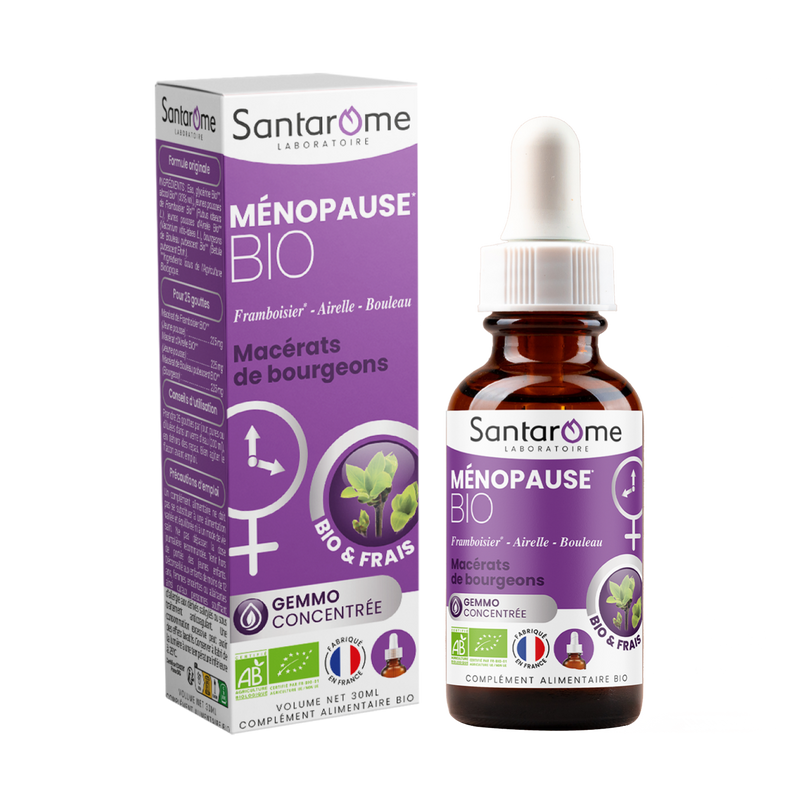Muscle pain during menopause
Written on February 14, 2025, by Pauline de Santarome
Menopause is a natural phenomenon that occurs in women when they reach a certain age. The production of estrogen and progesterone decreases, leading to the end of menstruation.
This phenomenon can increase the risk of certain diseases, such as osteoporosis and heart disease. Menopause usually occurs between the ages of 45 and 55, but its onset can vary considerably from one woman to another.
Symptoms of menopause
Menopause symptoms can vary significantly from one woman to another, but here are some of the most common symptoms:
-
Hot flashes: Feelings of intense heat that spread across the face, neck, and chest.
-
Night sweats: May be associated with hot flashes and can also disrupt sleep.
-
Vaginal dryness: Decreased estrogen levels can lead to vaginal dryness, pain during intercourse, and more frequent vaginal infections.
-
Fatigue: Menopause can cause fatigue and a decrease in energy.
-
Irritability and mood swings: Usually caused by hormonal fluctuations.
-
Memory and concentration problems: Caused by an imbalance in the body's hormones.
-
Weight gain: Over time, muscle mass tends to decrease and fat mass tends to increase.
-
Joint and muscle pain: Knees, hands, feet, shoulders, or neck—joint and muscle pain are the most common symptoms.
Some people may not experience any symptoms or may have very few. If concerns arise or symptoms become bothersome, it is strongly recommended to consult a doctor.

Diagnosis of menopause
The diagnosis of menopause is generally based on the woman's age and the absence of menstruation for 12 consecutive months.
To confirm the diagnosis, a doctor may perform hormone tests to measure estrogen and progesterone levels in the blood. A gynecological examination may also be performed to check for changes specific to menopause, such as vaginal tissue atrophy.
A doctor can help you assess your health and set up a treatment plan to relieve menopause symptoms.
Muscle and joint pain during menopause
Muscle and joint pain can be common symptoms of menopause, but this varies from woman to woman.
Hormonal changes during menopause can lead to a loss of bone density and a decrease in muscle mass, which can increase the risk of joint and muscle pain.
Hormonal fluctuations can also cause joint pain and stiffness, especially in people who do not exercise enough to maintain their physical condition.
It should be noted that joint and muscle pain can have other consequences, such as:
Injuries,
Chronic diseases,
Pain disorders.
It is therefore important to consult a doctor to assess the origin of these pains and rule out other possible causes.
The role of calcium and magnesium in bone health
Calcium and magnesium are important minerals for bone health. Calcium is necessary for bone formation and strength, while magnesium is involved in calcium metabolism and bone formation. A deficiency can lead to growth disorders and low bone density. It is therefore important to have a balanced diet rich in these minerals to maintain good bone health.
Natural solutions to relieve menopause symptoms
There are several natural remedies that can help relieve menopause symptoms:
- Herbal medicine: Plants such as lemon balm, chamomile, verbena, sage, soy, and red clover have properties that can help reduce hot flashes, mood swings, and sleep disturbances associated with menopause.
- Acupuncture: This traditional Chinese practice can help regulate hormone levels and relieve menopause symptoms.
- Homeopathy: Certain substances such as Ignatia, Pulsatilla, and Sepia can help relieve emotional symptoms such as anxiety and depression.
- Relaxation: Relaxation techniques such as meditation, deep breathing, and yoga can help reduce stress and anxiety related to menopause.
Please note that these solutions may not be suitable for all women, so it is important to consult a doctor to discuss the various options.
Physical activity to relieve menopause symptoms
Several studies have shown that physical activity limits the occurrence of hot flashes and reduces their intensity. In addition, symptoms such as sleep and mood disorders improve with exercise.
The WHO (World Health Organization) has established recommendations for physical activity for menopausal women, stating that they should engage in at least 150 minutes of physical activity each week.
There are many benefits to exercising to relieve menopause symptoms. First, exercise can help regulate hormone levels, which can reduce hot flashes and mood swings.
Sleep quality, which is often disrupted during menopause, can be improved by engaging in physical activity.
In addition, exercise can strengthen bones, which is important because women are at greater risk of developing osteoporosis during menopause.
Finally, physical fitness and mental well-being can improve with exercise, which can help women feel better about their bodies and thus better manage the changes associated with menopause.
⭐⭐⭐⭐⭐ - Séverine
Try it, you'll love it!
I've been using the complex for three weeks and I already feel better. Plus, it's convenient to use.
Gummies to relieve the discomfort of menopause
Gummies are a form of dietary supplement that can be more convenient and pleasant to take than tablets or capsules. This can be useful if you take them every day for a long period of time.
Gummies containing ingredients such as phytoestrogens can help relieve certain symptoms of menopause. Phytoestrogens have a similar structure to the estrogen produced naturally by the body, so they help regulate estrogen levels, which decline during this period.
Please note that gummies are not medicines, and it is recommended that you consult a doctor before starting a program.
Santarome organic gummies
Santarome Bio's Ma Ménopause gummies provide greater comfort during menopause. Made with organic maca, organic sage, and organic cranberry, the formula helps reduce hot flashes and night sweats associated with menopause.
Sage:
Since ancient times, sage has been recognized as a life-saving medicinal plant. Today, it is used to alleviate hormonal problems and menopause-related disorders. Sage helps alleviate certain common symptoms of menopause, such as night sweats and hot flashes.
Maca:
Maca is a perennial plant that resembles radish. It is used in traditional Peruvian medicine to relieve symptoms associated with menopause. This adaptogenic plant is a natural alternative to various hormone replacement therapies. It stimulates the body's glands to produce the hormones it needs. Maca's regulatory action affects all important functions: the hormonal system, nervous system, immune system, blood pressure, etc.















